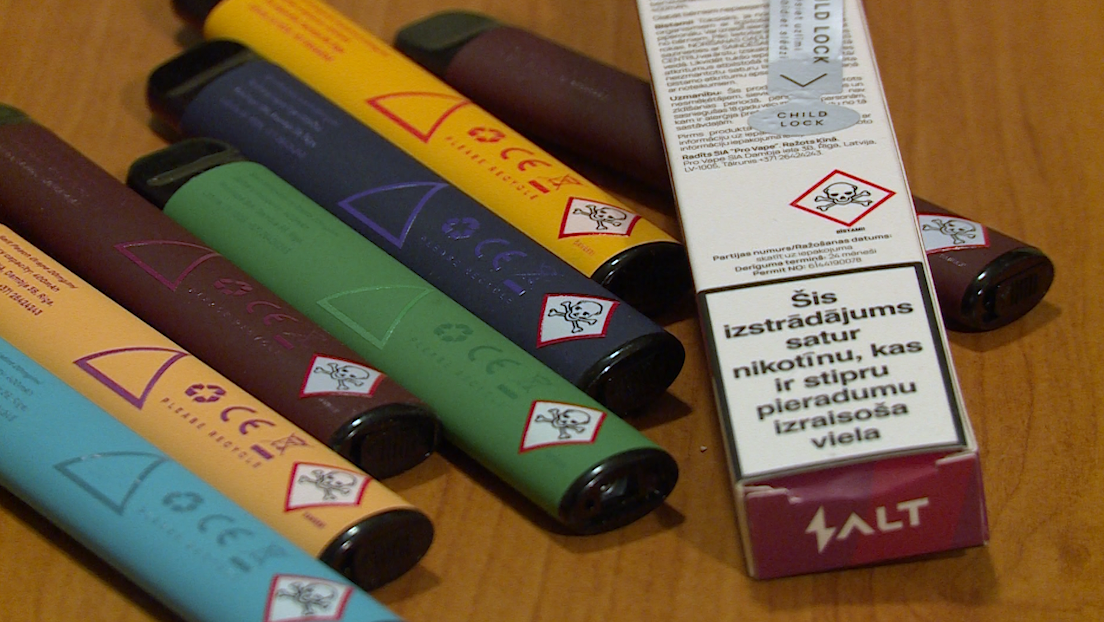The EU has adopted new recommendations on the use of electronic smoking devices in public places. Although Latvia already has quite strict rules in this respect, the Ministry of Health plans to propose further restrictions, including a ban on the use of electronic cigarettes from the windows of residential buildings, Latvian Radio reports December 10.
The Employment, Social Policy, Health and Consumer Affairs Council (EPSCO) has called for an extension of restrictions on public exposure not only to tobacco smoke but also to vapors from electronic smoking devices. In Latvia, smoking cigarettes and electronic smoking devices is currently not allowed on balconies, staircases, train platforms, and bus shelters, or in other public areas, including educational establishment and workplaces. In the future, the use of electronic cigarettes could also be banned from windows in residential homes, work environments, public places, and catering establishments.
Artjoms Uršuļskis (New Unity), Parliamentary Secretary at the Ministry of Health, explains what is planned:
“We should regulate what happens to smoking from windows – whether it is tobacco or vapor – because we have a regulation on balconies, but we might need to work on residential (house) windows. But the main idea is to protect the public not only from tobacco smoke but also from vapor.”
It is not known at this stage when the regulation on the use of electronic cigarettes in public could come into force, but it could be on the agenda next year.
At present, the State Police or municipal police are responsible for monitoring whether smoking is taking place in unauthorized places. Violations are punishable by a warning or a fine of up to €100.
However, this recommendation by the Council of Ministers of the European Union to reduce the use of electronic devices in public places is opposed by the Smokefree Industry Association, which considers that it is disproportionate and that the introduction of a restriction could cause more problems than benefits. Marita Jansone, Executive Director of the Association, points out that there are already extensive restrictions on the use of smoking, including smokeless products, in both public and private environments.
“These restrictions and bans are often neither respected nor enforced. Our call would therefore be to reflect on the need for and proportionality of additional restrictions to avoid declaratory bans that are only on paper but which are not monitored and enforced,” says Jansone.
She stresses, however, that the Association understands and supports the right of non-smokers to be in a smoke-free environment. The Association recommends that specific areas be created for the exclusive use of smoke-free products outdoors or in workplaces that are inaccessible to cigarette smokers. She also stressed that the use of smokeless devices or their vapors does not pose a risk of passive smoking, but is a less harmful alternative to smoking traditional cigarettes.
However, Alvils Krams, a pneumonologist and the chief specialist in pneumonology at Riga East Clinical University Hospital, disagrees, saying that passive smoking affects health and that electronic cigarettes are being smoked by younger and younger people. He stresses that everything that is inhaled is toxic, whether it is the smoke from conventional cigarettes or the vapor from electronic cigarettes.
“Of course, the process is slightly different – one is the high-temperature vaporization process and the other is the combustion process. But there are a lot of toxic substances and carcinogens,” says Krams.
Edgars Rudzītis, deputy chief of the Riga municipal police, said that the police carry out checks in places where people gather, near educational institutions and in entertainment venues. Citizens are quite active and report smokers who do not respect the rules.
According to Riga municipal police, some 600 reports of smoking have been received this year. These include reports of underage smoking, smoking in stairwells and balconies of apartment buildings, and smoking in unauthorized places.
It is not yet known when the European Commission’s recommendations might come into force, but the Ministry of Health suggests it could be next year.






